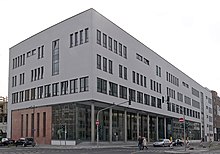Our website is made possible by displaying online advertisements to our visitors.
Please consider supporting us by disabling your ad blocker.
Hoch Conservatory
 The Conservatory in Frankfurt-Ostend in 2009 | |
| Type | Public |
|---|---|
| Established | 1878 |
| Address | Sonnenmannstraße 16 , , , Germany 50°6′36″N 8°41′59″E / 50.11000°N 8.69972°E |
| Website | www |
Dr. Hoch's Konservatorium – Musikakademie was founded in Frankfurt am Main on 22 September 1878. Through the generosity of Frankfurter Joseph Hoch, who bequeathed the Conservatory one million German gold marks in his testament, a school for music and the arts was established for all age groups. Instrumental to the foundation, prosperity and success of the conservatory was its director Joachim Raff who did most of the work including setting the entire curriculum and hiring all its faculty.[1] It has played an important role in the history of music in Frankfurt. Clara Schumann taught piano, as one of distinguished teachers in the late 19th century, gaining international renown for the conservatory. In the 1890s, about 25% of the students came from other countries: 46 were from England and 23 from the United States.
In the 1920s, under director Bernhard Sekles, the conservatory was far ahead of its time: Sekles initiated the world's first Jazz Studies (directed by Mátyás Seiber)[2] and in 1931 the Elementary Music Department.
Dr. Hoch's conservatory offers instruction in the Music Education for Youth and Adults (ANE) program, the Elementary Music Department (Basisabteilung), and the Pre-College-Frankfurt (PCF) program, which provides preparation for future studies at a Hochschule or conservatory. There are also Ballet, Early Music and New Music departments. The following qualifications are available: Bachelor of Music in Performance and Pedagogy in all instruments, voice, music theory, composition, performance and Elementary Music Pedagogy.
- ^ "Raff's Role in Dr. Hoch's Conservatory". Archived from the original on 28 July 2016. Retrieved 24 May 2016.
- ^ "This was actually the first academic program for the study of jazz anywhere in the world." Kathryn Smith Bowers, "East Meets West. Contributions of Mátyás Seiber to Jazz in Germany." Jazz and the Germans, (Ed. Michael J. Budds), Hillsdale, NY: Pendragon Press, 2002, ISBN 978-1576470725, S. 122.
Previous Page Next Page


